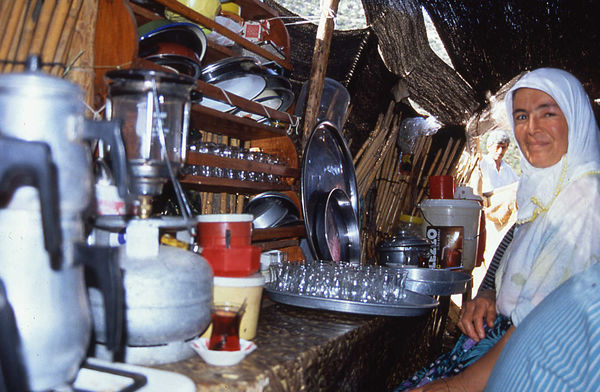Turkish Village Insights
In the Turkish countryside, rituals and family bonds reinforce centuries-old communities.
By Rick StevesWhile much of Turkey — particularly its main metropolis of Istanbul — is scrambling to join the modern world, in rural areas, more traditional, richly dyed ways of life are woven into the land like a Turkish carpet.
Wander beyond Istanbul into Turkey's countryside, where cars share the road with donkey carts. You'll still find sleepy goats playing Bambi on rocks overlooking the black tents of nomad goatherds.
On one trip, I remember hearing, from high above me on a hillside, the lone but happy song of a goatherd's flute playing Turkey's golden oldies. I wandered over to the goatherd nearest me and asked why goat tenders play the flute. "So the goats know they are loved," he told me.
A common thread of village life seems to be artisans who enjoy showing off — and for good reason. I once visited a woodcarver famous for creating exquisite prayer niches. Every village in the region wanted one for their mosque. I got to watch him at work, observing his skill while chips flew. His deftness was clearly the result not just of decades of practice, but of know-how passed down from generation to generation.
Suddenly he stopped, held his chisel high to the sky, and declared, "a man and his chisel, the greatest factory on Earth." When I asked to buy one of his carvings, he said, "For a man my age, just to know that something I carved would be taken to America and appreciated…that's payment enough. Please take this as my gift to you."
I've long noticed how Turkish towns are typically cluttered with ugly, unfinished concrete buildings bristling with rough, spiky rooflines of rusty reinforcement bars. I used to think, "Why can't these people get their act together and just finish these buildings?" That was before I learned that in Turkey, there's an ethic among parents — even poor ones — that you leave your children with a house.
Historically, Turks have been reluctant to store money in the bank because it devalues with inflation. So instead, they invest by incrementally constructing a building. They leave the rebar exposed until they have another hundred bucks, when they make another wall, put in a window, frame in another door…and add more rebar. Now when I see the rusted stuff, I see evidence of a gift of a lifetime, growing bit by bit. "Rebar holds the family together here," a Turkish friend once told me. It's no longer ugly to me.
As in my hometown, family bonds are especially evident during big celebrations. On one visit to Güzelyurt, in central Turkey, I was the special guest at a wedding. The entire community gathered. Calling the party to order, the oldest couple looked happily at the young bride and groom and shared a local blessing: "May you grow old together on one pillow." Then someone cranked up the music, and everyone was swept onto their feet — including visiting tourists. Dancing in Turkey easy: Just hold out your arms, snap your fingers, and wiggle your shoulders, as the locals do.
The father of the groom came over to me — the foreigner — and wanted to impress me. Waving me to a quiet corner, he said, "Here on my wall, the most sacred place in my home, is the bag where I keep my Quran. And in my Quran bag I also keep a copy of the Bible and a copy of the Torah — because I believe that we Muslims, Christians, and Jews are all 'people of the Book'…children of the same good God."
On a previous visit, I arrived to find one part of town all decked out for a circumcision party. It's a huge deal here — "a wedding without the in-laws," as one friend described it to me. The little boy, dressed like a prince, rode tall on his decorated horse through a commotion of friends and relatives to the house where a doctor was sharpening his knife. Even with paper money pinned to his fancy outfit and loved ones chanting calming spiritual music, the boy looked frightened. But the ritual snipping went off without a hitch, I'm told, and a good time was had by…well, at least, by everyone else.
That evening, at my friend's urging, we climbed to a rooftop to watch a dervish whirl. Dervishes belong to a Muslim sect that follows the teachings of Mevlana, the 13th-century Persian poet better known abroad as "Rumi." While tourists typically see the whirling dervishes as a kind of cruise-ship shore excursion entertainment, it is a meditative form of prayer and worship.
The dervish agreed to let us observe if we understood the meaning behind the ritual. He explained that while whirling, one foot is anchored in his home, while the other foot steps 360 degrees around as if connecting to the entire world. One arm is raised and the other is lowered. As the dervish turns he becomes a conduit, symbolically connecting the love of God with all of creation.
He spun himself into a trance. With his robe billowing out, his head cocked peacefully to the side, and his arms a tea kettle of divine love, the sun set on a village that offered such a rich insight into a world so far from my own.
Complicated and ancient, exotic and down-to-earth, Turkey beckons. Those who haven't been to Turkey wonder why anyone would choose to go there. Those who've been dream of returning.


